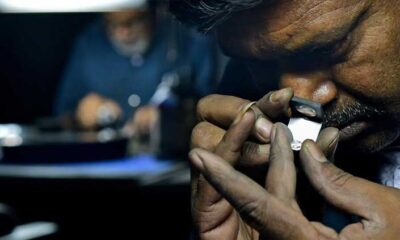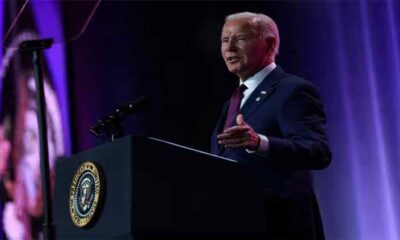Six months after she got the call informing her that her UN assistance would be cut, Najwa al-Jassem is struggling to feed her four children and pay rent for their tent in a Syrian refugee camp in Lebanon’s eastern Bekaa Valley.
She once received food rations and cash that covered most of their modest monthly expenses. The family now only gets the equivalent of $20 a month, which just covers the rent for their cramped tent.
Her husband gets only sporadic day labour and “my kids are too young for me to send them to work the fields,” she told The Associated Press in the camp near the town of Bar Elias. “We’re eating one meal a day.”
Aid agencies will struggle to draw the world’s attention back to the plight of Syrians like al-Jassem on Wednesday at an annual donor conference hosted by the European Union in Brussels for humanitarian aid to respond to the Syrian crisis.
Funding from the two-day conference will also go toward providing aid to Syrians within the war-torn country and to some 5.7 million Syrian refugees living in neighboring countries, particularly Turkey, Lebanon and Jordan.
This year, organisers aim to raise some $11.2 billion, though humanitarian officials acknowledged that pledges will likely fall short.
On Tuesday, a day before the conference, the World Food Programme announced that it was faced with an “unprecedented funding crisis” and would cut aid to 2.5 million out of the 5.5 million people in Syria who had been receiving food assistance.
The conference comes as Syria’s protracted uprising-turned-civil-conflict has entered its 13th year, and after a deadly 7.8 magnitude earthquake rocked large swaths of Syria in February, further compounding its misery. The World Bank estimated over $5 billion in damages, as the quake destroyed homes and hospitals and further crippled Syria’s poor power and water infrastructure.
It also comes at a politically precarious time for refugees living in neighboring countries. Syrian President Bashar Assad recently received a major political lifeline with the return of Damascus to the Arab League, and Syria’s neighbours have, in return, called for a mass repatriation of refugees.
Anti-refugee rhetoric has surged in neighboring Lebanon and Turkey, both dealing with economic and political crises.
In Lebanon, where officials have put the blame for the country’s economic crisis onto the country’s estimated 1.5 million refugees, authorities have imposed curfews on refugees and restricted their ability to rent homes. Rights groups have said the Lebanese military has deported hundreds of Syrian refugees in recent months.
In Turkey, where Syrians were once welcomed with compassion, repatriation of the roughly 3.7 million refugees became a top theme in last month’s presidential and parliamentary elections, which ended in a new term for incumbent President Recep Tayyip Erdogan.
Erdogan’s government for years defended its open-door policy, but has in recent years been building housing developments in areas of northwestern Syria controlled by Ankara-backed Syrian opposition groups, with the stated aim of encouraging refugee returns. Ankara and Damascus have also been holding talks in Moscow to improve strained relations.
The government has also carried out sporadic forcible deportations, while Erdogan’s challengers took a harder line, vowing to deport refugees en masse.
While some Syrian refugees have voluntarily returned from Turkey and Lebanon, most say the situation is too volatile.
At the camp in Lebanon, Fteim Al-Janoud struggled to hold back her tears as she talked about how she and her husband can only afford to send one of her six children to school. But the refugee from Syria’s northern Aleppo province said the situation there is even worse, both in terms of security and material concerns.
“If the conditions were good and if our homes were fixed so we could live peacefully and comfortably, we wouldn’t have a problem going back to Syria, even with Assad still there,” she said.
Despite the deteriorating situation for Syrians, aid has dwindled in recent years, as donors rushed to support over 5 million Ukrainian refugees and over 7 million internally displaced in the conflict-hit European country. The war in Ukraine, a global bread basket, also sparked a food inflation surge on the heels of the COVID-19 pandemic that rocked the global economy for years.
“We see needs are increasing, and we also see that that donor funding is gradually going down,” said Ivo Freijsen, the UN refugee agency’s representative to Lebanon, where some 90% of refugees live in extreme poverty and are dependent on aid.
“From a humanitarian point of view, it means that more people will be suffering,” he said. “We need to be seeking to see funding levels stay at the same level and actually increase.”
At last year’s conference in Brussels, donors pledged $6.7 billion, falling billions short of the UN’s $10.5 billion appeal, split almost evenly to assist Syrians inside the war-torn country and refugees. The funding shortage forced hospitals in opposition-held northwestern Syria to cut back services, while the U.N. World Food Program cut the size of its monthly rations for the more than 1 million people it serves in that area.
“We know that Ukraine has taken a big toll,” said U.N. Resident and Humanitarian Coordinator in Lebanon Imran Riza. “We know that Sudan has now become also quite a priority. It’s a difficult time and it’s a time that’s also following COVID and everything else that happened that hit economies so hard across the globe.”
Given those difficulties, he said international donors need to “move towards much more sustainable interventions” rather than remaining in crisis mode.
At the camp in the Bekaa Valley, Al-Jassem says she’s struggling to cope with mounting debts she and her husband have to cover unpaid rent and medical expenses.
But she’s more worried about the well-being of her children, who have lived their entire lives in a refugee camp in worsening conditions.
“The kids sometimes go to school without having breakfast,” she explained. “Their teacher would sometimes call me and ask why they didn’t bring a sandwich with them, and I would say it’s because I have nothing in the pantry.”
Post Views: 59


 Fashion3 months ago
Fashion3 months ago
 World3 months ago
World3 months ago
 World3 months ago
World3 months ago
 Sports2 months ago
Sports2 months ago
 Sports2 months ago
Sports2 months ago
 World3 months ago
World3 months ago
 Tech3 months ago
Tech3 months ago
 Business2 months ago
Business2 months ago



















